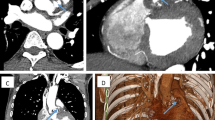Abstract
We report a case of infectious endocarditis in a 77-year-old woman who was undergoing maintenance hemodialysis therapy, and who was also having a prosthetic aortic valve replacement. The disease resulted from a local skin infection at the needle puncture site of the arteriovenous fistula. Ampicillin-resistant Staphylococcus aureus was the causal organism. Surgical treatment could not be performed because of associated intracranial hemorrhage due to septic embolism. In spite of intensive treatment with several antibiotics, a ventricular septal abscess just beneath the prosthetic aortic valve progressed to form a ventricular septal fistula. The resultant intracardiac left-to-right shunt led to refractory congestive heart failure. The patient finally died of heart failure. The formation of a ventricular septal fistula is considered to be a rare and extraordinary complication of infectious endocarditis in a hemodialysis patient with aortic valve replacement.
Similar content being viewed by others
Author information
Authors and Affiliations
Additional information
Received: July 25, 2001 / Accepted: November 3, 2001
About this article
Cite this article
Horita, S., Shinoda, T., Yoshimoto, H. et al. Ventricular septal fistula formation due to infectious endocarditis in a hemodialysis patient with aortic valve replacement. Clin Exp Nephrol 6, 71–74 (2002). https://doi.org/10.1007/s101570200011
Issue Date:
DOI: https://doi.org/10.1007/s101570200011




